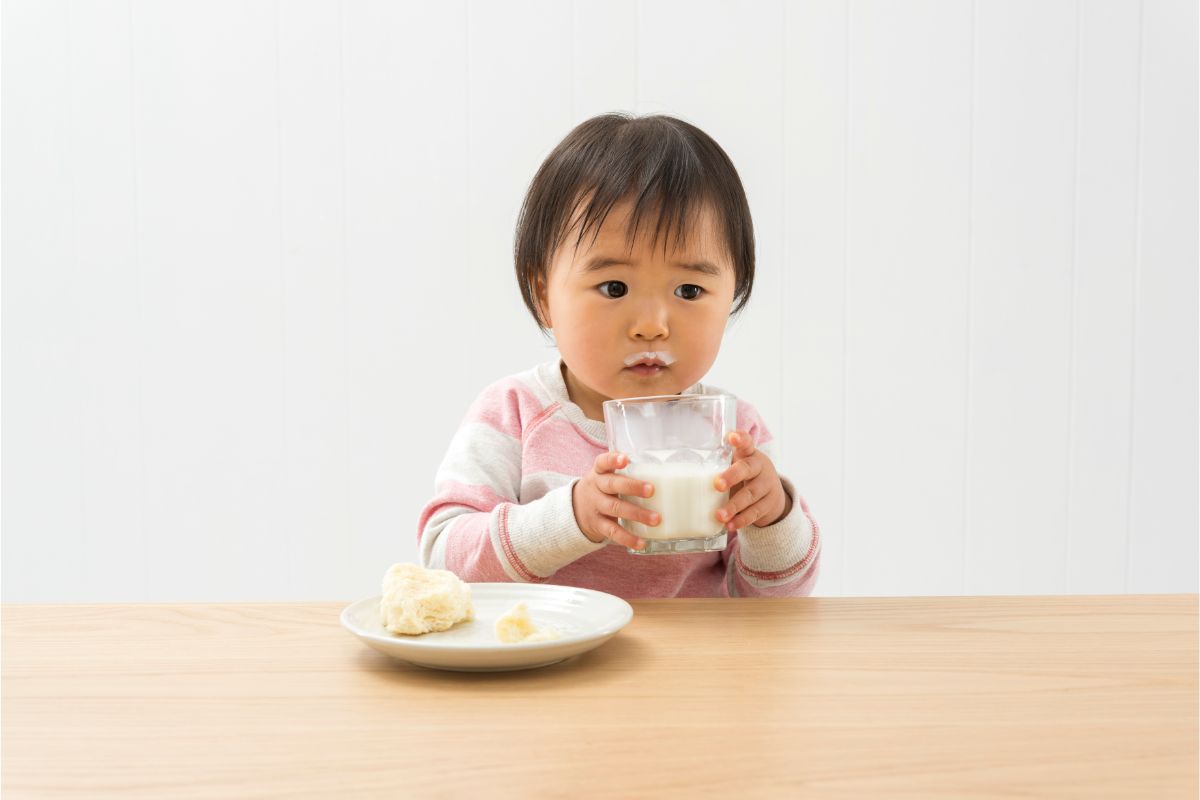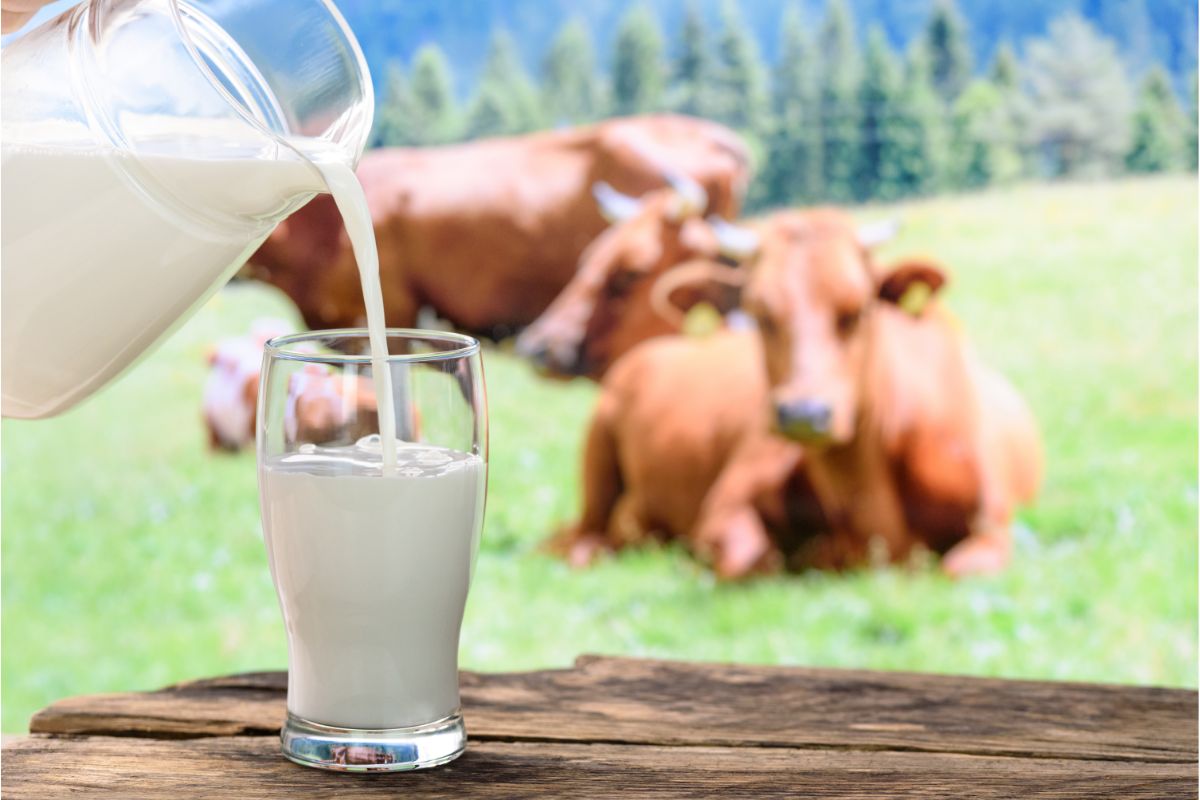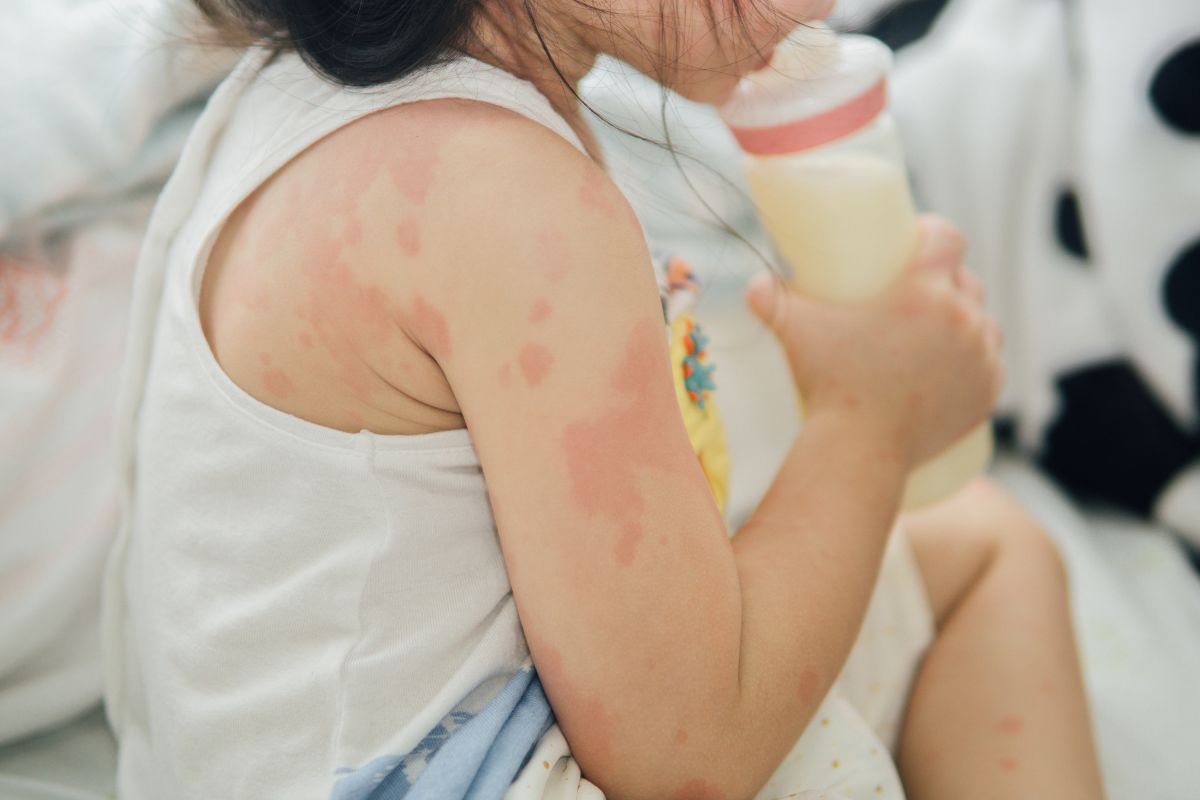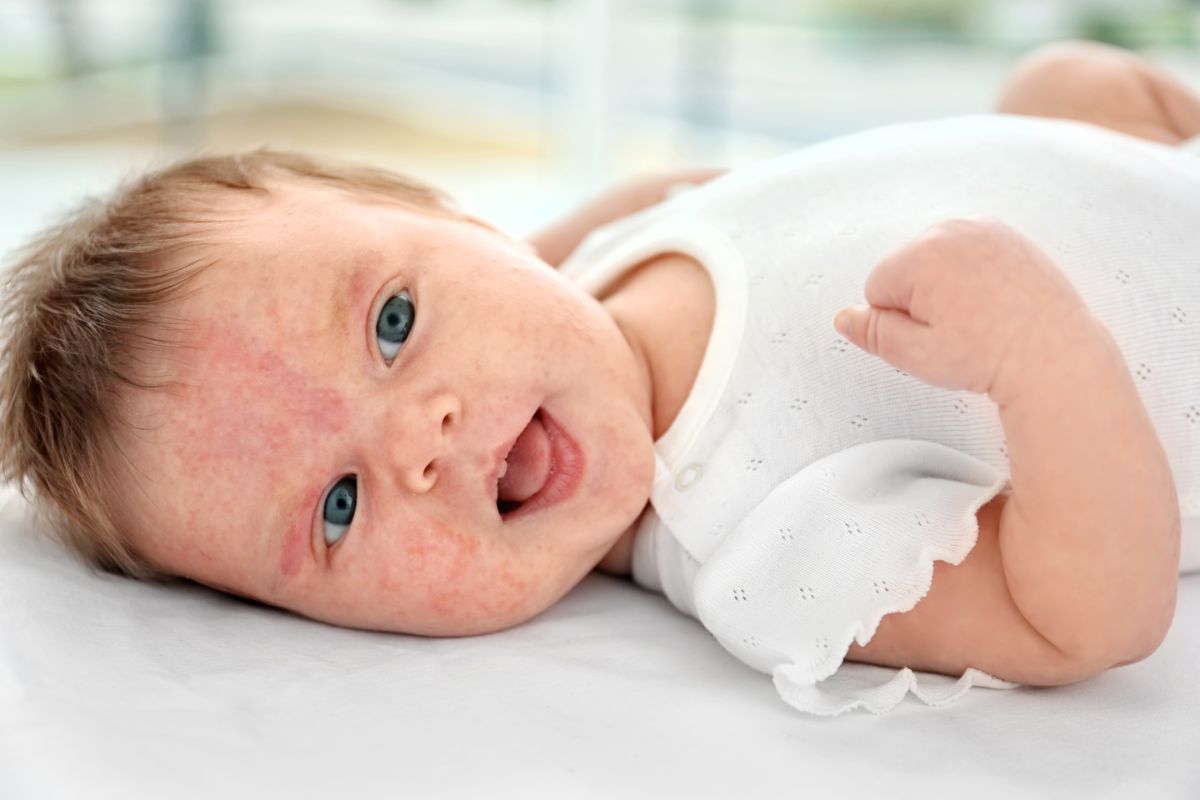Allergies are something we all have and something we all have to learn to live with. As adults, allergies can be quite easy to identify when they arise.
We can clearly spot an allergy, communicate how we feel, and contact a doctor when necessary.

However, for children, the story is very different. Children, more often than not, don’t even know what an allergy is, let alone how to communicate about it with their parents.
Therefore, parents have an important responsibility when it comes to spotting the signs and symptoms of an allergy, before doing the right thing about it.
One common allergy we parents need to spot is our child’s allergy to milk. The fact you’re here would suggest you think your child is allergic to milk and you need to know what to do.
If so, you’ve come to the right place. In this post, we’ll tell you what an allergy to milk is, what the symptoms are, and what you should do.
Stick around if you need to learn more!
What Is A Milk Allergy?
Before we look at the signs and symptoms of a milk allergy, and what to do if your child has one, let’s start by looking at what exactly a milk allergy is.
Also known as cow’s milk protein allergy, a cow’s milk allergy (CMA) is up there with the most common food allergies small children experience.
This type of food allergy is actually believed to affect approximately 7% of children under the age of 1.
Generally speaking, an allergy to cow’s milk means that a person’s immune system overreacts to the proteins in the milk.
To put it simply, every time someone with a milk allergy drinks milk, their body thinks the proteins are harmful to the body. This makes the body work tirelessly to fight the proteins.
This causes an allergic reaction. During the allergic reaction, the body will release chemicals called histamine.
For most people, milk allergy symptoms are fairly mild, resulting in coughing, wheezing, or an upset stomach. However, those with serious allergies may require an epinephrine auto-injector to combat symptoms.
This form of treatment is given to prevent a severe reaction known as anaphylaxis.
Cow’s Milk Allergy In Babies

Anyone can have an allergy to milk but as we mentioned above, it is most common in babies under the age of 1.
If your child is allergic to milk, they will most likely show signs or symptoms a couple of days or weeks after they first drink a cow milk-based baby formula.
Interestingly, babies that have been breastfed are less likely to have a milk allergy than babies that have been raised on formula.
Another interesting fact is that most children also grow out of their milk allergy by the time they reach the age of 5.
If your baby didn’t seem to be allergic to milk after first trying a cow’s milk-based formula, but is now, don’t panic, it is completely normal for children to also develop milk allergies when they start eating solid foods.
There are two types of cow’s milk allergy that affect children:
- Immediate CMA – Just minutes after drinking cow’s milk, symptoms will start.
- Delayed CMA – Symptoms typically start several hours, days, or weeks after drinking cow’s milk.
Bearing in mind allergies can show up at any time, it is super important that you know how to spot an allergy and how to deal with it. We’ll look at this next!
Signs And Symptoms Of Milk Allergies In Children
There is a wide range of different signs and symptoms that might suggest your child has an allergy to milk.
This can make it quite hard to identify whether it is a milk allergy or not but you should still always take action.
You’ll find the most common signs and symptoms of milk allergies in children below:
- Wheezing – A wheezing noise when your child breathes out.
- Skin reactions – A red rash, itchiness, and swelling around the eyes and on the face.
- Digestion problems – Vomiting, diarrhea, constipation, colic, and stomach aches.
- Eczema – Eczema can be a sign of a milk allergy.
- Trouble breathing – Does your child struggle to breathe regularly?
- Lightheadedness – Has your child experienced a sudden drop in blood pressure or lost consciousness.
The severity of your child’s milk allergy might vary. The same child can react differently to each exposure.
It is important to know this because even though one allergy was mild, the next could be extremely severe or even life-threatening.
What To Do?

If you believe your child has a milk allergy there are a number of things you should do. Like with any allergy, what you do first will always depend on how serious the allergic reaction is.
If your child isn’t currently having an allergic reaction and you’re simply concerned they may have an allergy based on previous situations, take your child to your local doctor.
The doctor will then be able to test your child and come to a suitable diagnosis.
They will then put a specific plan in place to deal with any allergies and prevent any severe reactions in the future.
If your child is experiencing a severe allergy, whether it be a milk allergy or not, you should immediately head to your local emergency department.
You may even wish to call 911. Symptoms of a severe CMA include swelling in the throat and mouth, shortness of breath, heavy breathing, and difficulty talking.
These symptoms can potentially result in death so take the appropriate cause of action quickly.
How Is A Milk Allergy Diagnosed In A Child?
If you decide to take your child to the doctor in order to find out if he/she has a milk allergy, the doctor will start by asking you a number of questions about what is going on.
The doctor will ask for a description of symptoms before then examining your baby. To do this, the doctor may have to perform a blood test or take a stool sample.
In some instances, your doctor might even refer your child to an allergist that specializes in allergies.
From there, the allergist might carry out some skin tests. This is a simple test that won’t cause your baby any harm.
For the skin test, a doctor or nurse will put a small bit of milk protein on your baby’s skin (usually on the arm). If your child reacts to the allergen, the skill will start to look like a small insect bite.
If your baby is found to be allergic to milk, appropriate action and treatment will be provided.
Treatment For Cow’s Milk Allergy

In terms of the treatment then given to a child that has been diagnosed with a milk allergy, the doctor will give you and your child all the help and guidance you need.
They will help you manage your baby’s diet, provide you with any essential medication, and potentially refer you to a dietician for extra assistance.
The first port of call in any milk allergy treatment plan is to remove any milk from your child’s diet. If your baby is fed via a formula, your doctor will prescribe a special child formula.
You may also be given an epinephrine auto-injector if the doctor believes that your child’s allergy is bad enough. This should only be used if your child is having a serious allergic reaction.
Apart from that, the doctor will simply request that you bring your child back every 6 to 12 months for a check-up. This is so the doctor can decide if your child has grown out of their allergy or not.
Could Your Child Be Lactose Intolerant Instead?
There is a chance that your child might not be allergic to milk but could be lactose intolerant instead.
Lactose intolerance is a reaction to milk. It occurs when the body isn’t capable of digesting a natural sugar called lactose.
This is not an allergy but it can have similar symptoms.
Symptoms of lactose intolerance include:
- Diarrhea.
- Stomach aches
- Wind
- Vomiting
This is another condition that will have to be identified by a doctor. The chances are, that the doctor will check for lactose intolerance when testing your child for a milk allergy.
Final Thoughts
Despite being quite unpleasant, when treated correctly a milk allergy doesn’t need to be something you need to worry about too much.
By simply keeping your child away from milk and by keeping an epinephrine auto-injector nearby, you can ensure your child stays safe.
While it can be difficult to identify milk allergies in children, once you know what to look for things become a lot easier.
In this post, we’ve shown you what a milk allergy is, how it affects children, the signs and symptoms that show a child might have a milk allergy, and how to go about dealing with one.
If you think your child has an allergy to milk, take them to their doctor for checks as soon as you can, and always remember, if your child is having a severe allergic reaction, take them to a hospital or call 911 immediately.
- Understanding Male Reproductive Health: A Complete Guide - February 2, 2025
- Simple Healthy Skin Habits for Radiant Skin - December 6, 2024
- Unlocking the Connection Between Nutrition and Mental Health - December 3, 2024








